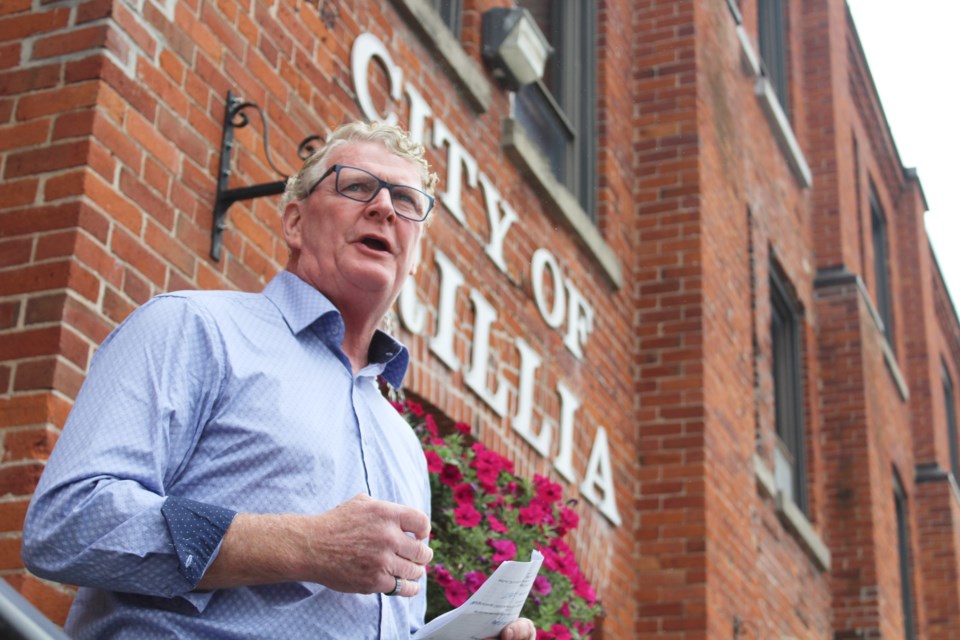A report on how climate change could be experienced locally includes some alarming projections, but officials say there’s still time to change that trajectory.
ICLEI, or Local Governments for Sustainability, an international non-governmental organization that focuses on promoting sustainable development, has been providing training to City of Orillia staff to help them plan for ways to address climate change.
The organization also produced a climate change projections report for the city.
“The projections include significant warming across seasons and an increase in annual average temperatures, from 6.5 degrees Celsius as the annual baseline to 8.6 C between 2021 and 2050 and rising all the way to 10.9 C annual average temperature between 2051 and 2080,” staff noted.
Mayor Steve Clarke said the city is committed to taking action to avoid seeing those increases.
“Whether it’s 8.6 C in 2050 or 10.9 C in 2080, we can’t let either of those happen because these extreme weather conditions will happen more often and more severely,” he said, adding the goal is to keep the average temperature from rising more than 1.5 C by 2050.
The city is focusing on both mitigation, such as reducing greenhouse gas emissions, and adaptation, which means adapting to current and future climate situations.
Clarke noted the city implemented a stormwater master plan a few years ago as a way to help the system deal with increased precipitation. He described that as “a significant action on adaptation.”
Orillia’s climate change action plan is in the works and is expected to be presented to council in January. In the meantime, the city is taking measures to reduce negative effects on the environment, Clarke said.
They include undertaking a greenhouse gas inventory at some city facilities, installing electric vehicle charging stations at the Orillia Recreation Centre and implementing a clear garbage bag program, coming into effect in February, in an effort to divert more waste from the landfill.
There is also a plan to eventually move the city’s fleet away from gas-powered vehicles.
To prevent the temperature increases projected in the report, it will take more than the municipality, Clarke said, noting the private sector and individual residents need to pitch in, too.
“The municipality is going to have to take the lead in helping to figure out what the private sector is going to do,” he said.
One measure the city is looking at was an idea suggested by Sustainable Orillia in 2019 — to make funding available for building retrofits.
Orillia can’t do it alone, though.
“We can reduce our greenhouse gas emissions through a number of different ways to meet the target we need to, but we’ll need other municipalities to do the same thing,” Clarke said.
Stan Mathewson, president of Sustainable Orillia, agreed.
Looking at the issue of climate change through a national or global lens, Orillia’s population is “a drop in the bucket,” he said.
“Everybody has to do their part.”
Like Clarke, Mathewson is confident action can be taken to prevent the projected temperature increases locally.
“If nothing changes, those are the numbers they’re forecasting, but we know that will not be the case. There’s going to be significant mitigation action,” he said. “(The projections) certainly suggest that we need to take action, and we need to take it sooner than later. Unless you make rapid changes now, those numbers are possible.”
Asked if everyone — from the municipality to residents — is taking enough action now, Mathewson quickly answered, “No.
“None of us are. We’re not doing enough.”
He praised the city for the measures it has implemented so far, including the stormwater master plan, but said even that plan needs to be revisited.
Flood-risk mapping needs to be updated, he said, because the reality of weather events is worse than what was initially projected.
They are “more intense, longer in duration and happen with greater frequency,” he said.
While municipal incentives are expected to help drive change, Mathewson urges individuals to do whatever they can in the meantime, including home retrofits and switching to electric vehicles.
If buying an electric vehicle isn’t financially feasible for some, he suggested they consider a used hybrid.
He also noted infrastructure for electric vehicles has improved and expanded in recent years.
“It’s rare that you would go somewhere and not be able to find charging stations,” he said.
Sustainable Orillia is helping the city as it works on its climate change action plan and looks forward to seeing the recommendations in the new year.
“We’re going to work closely with the city on whatever comes out of the plan,” Mathewson said.
More information about Sustainable Orillia can be found here.
